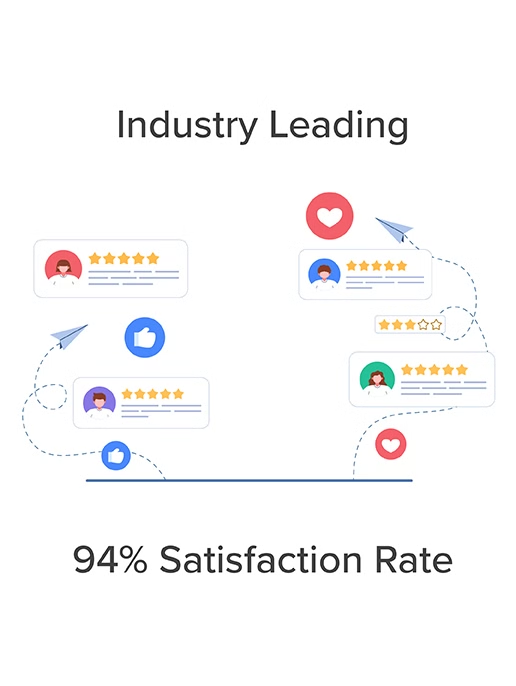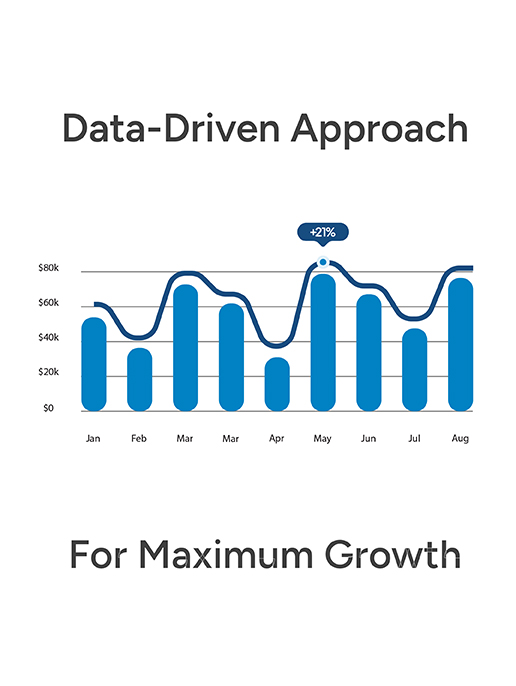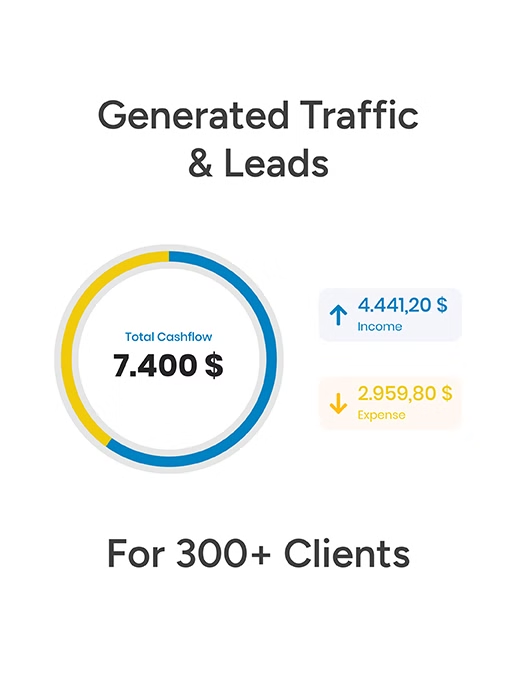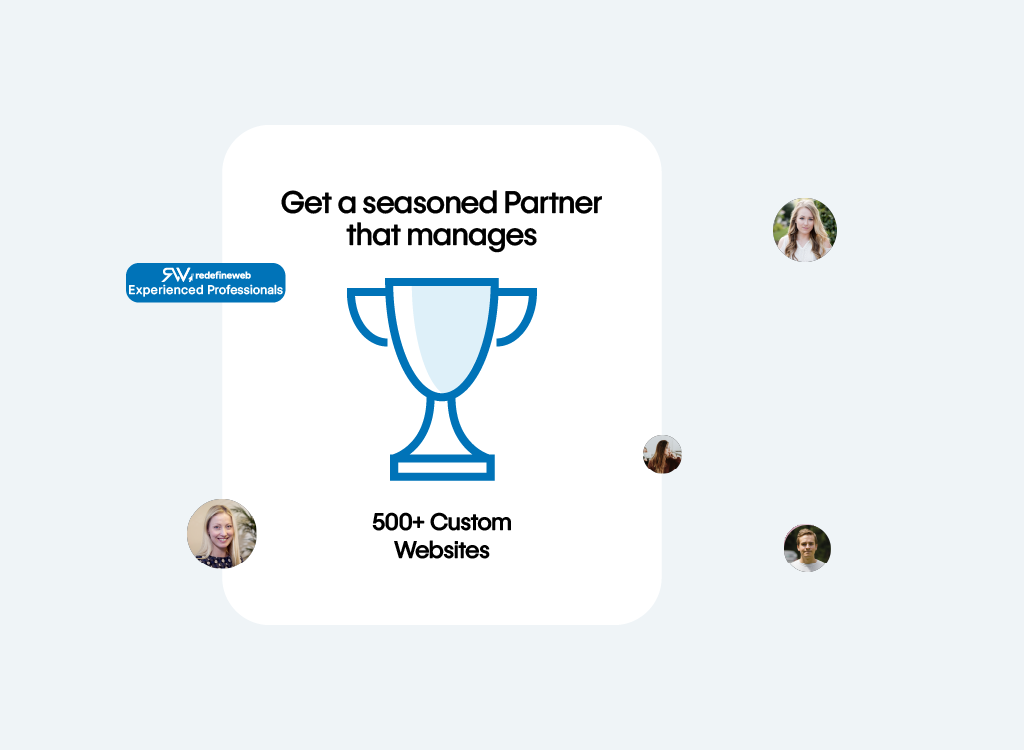


A professional web development agency typically charges between $4,000 to $10,000 to build a custom website for a chiropractic clinic. This can create significant budget challenges, limiting your ability to promote your practice and reach new patients online.
Instead, choose one of our chiropractor website packages and start with a free starter website. These plans are designed specifically for chiropractic professionals and address common challenges—including design, development, SEO, and patient-focused content creation.
With our comprehensive website packages, we handle all the technical details so you can focus on what you do best—providing exceptional chiropractic care to your patients.

A professional website is essential for any chiropractic clinic looking to attract new patients and build credibility. But even with user-friendly website builders, creating a site that truly represents your practice and delivers measurable results can take hours of your valuable time.
At Redefine Web, we provide all-inclusive solutions specifically designed for chiropractors — covering everything from website design and development to SEO and patient-focused marketing.
We take the time to understand your clinic’s goals, services, and target audience so we can tailor every detail to your practice. This personalized approach helps you stand out in your local market, connect with more patients, and establish long-term growth.
Many chiropractors struggle to find affordable website solutions that look professional and deliver real results. Traditional website packages often come with hidden costs or rate increases after the initial contract.
Instead of spending hours trying to figure out the best online solution, work with our expert chiropractic website designers to get a modern, patient-friendly website that reflects your expertise and the quality of care you provide.
Our websites are built with scalability in mind — so when your practice expands or you add new services, integrating them into your site is simple and seamless. Need a new feature or landing page? Just let us know, and we’ll handle the rest.

| Feature | Essential | Growth | Business | Custom |
|---|---|---|---|---|
| Design/Retainer Hours | 5 Hours (One-time) | |||
| Security Patches | ✓ | ✓ | ✓ | ✓ |
| Full-site backup | Monthly | Weekly | Weekly | ✓ |
| Security Scan | Monthly | Weekly | Weekly | ✓ |
| Server Migration | ✓ | ✓ | ✓ | ✓ |
| Copywriting | ✓ | ✓ | ✓ | ✓ |
| Keyword Research | ✓ | ✓ | ✓ | ✓ |
| Blog Posts | ✓ | 1 | 1 | 1 |
| Text Updates | ✓ | ✓ | ✓ | ✓ |
| On-page SEO | ✓ | ✓ | ✓ | ✓ |
| Photos Update | ✓ | ✓ | ✓ | ✓ |
| Off-page SEO |
| Feature | Essential | Growth | Business | Custom |
|---|---|---|---|---|
| Server Side Caching | ✓ | ✓ | ✓ | ✓ |
| HTTP Protocol | ✓ | ✓ | ✓ | ✓ |
| OpCache | ✓ | ✓ | ✓ | ✓ |
| Mod_Expires | ✓ | ✓ | ✓ | ✓ |
| Browser Cache | ✓ | ✓ | ✓ | ✓ |
| Brotli Compression | ✓ | ✓ | ✓ | ✓ |
| CDN | 82 POPs | 82 POPs | 82 POPs | 82 POPs |
| Feature | Essential | Growth | Business | Custom |
| Email Forwarders | ✓ | ✓ | ✓ | ✓ |
| Catch-all Emails | ✓ | ✓ | ✓ | ✓ |
| Email Aliases | ✓ | ✓ | ✓ | ✓ |
| IMAP/POP3/SMTP | ✓ | ✓ | ✓ | ✓ |
| Autoresponders | ✓ | ✓ | ✓ | ✓ |
| Filters | ✓ | ✓ | ✓ | ✓ |
| MX/SPF/DKIM Records | ✓ | ✓ | ✓ | ✓ |
| Email Virus Scanner | ✓ | ✓ | ✓ | ✓ |
| Feature | Essential | Growth | Business | Custom |
|---|---|---|---|---|
| Design/Retainer Hours | 5 Hours (One-time) | |||
| Security Patches | ✓ | ✓ | ✓ | ✓ |
| Full-site backup | Monthly | Weekly | Weekly | ✓ |
| Security Scan | Monthly | Weekly | Weekly | ✓ |
| Server Migration | ✓ | ✓ | ✓ | ✓ |
| Copywriting | ✓ | ✓ | ✓ | ✓ |
| Keyword Research | ✓ | ✓ | ✓ | ✓ |
| Blog Posts | ✓ | 1 | 1 | 1 |
| Text Updates | ✓ | ✓ | ✓ | ✓ |
| On-page SEO | ✓ | ✓ | ✓ | ✓ |
| Photos Update | ✓ | ✓ | ✓ | ✓ |
| Off-page SEO |
We often send out our newsletter with news and great offers. We will never disclose your data to third parties and you can unsubscribe from the newsletter at any time.
Unfortunately, we’re unable to offer free samples. As a retailer, we buy all magazines from their publishers at the regular trade price. However, you could contact the magazine’s publisher directly to ask if they can send you a free copy.
You can create a new account at the end of the order process or on the following page. You can view all of your orders and subscriptions in your customer account. You can also change your addresses and your password.
No, you don’t have to create an account. But there are a few advantages if you create an account.
You never have to enter your billing and shipping address again
Find all of your orders, subscriptions and addresses in your account
Download invoices of your orders
No, we don’t have a physical store location at the moment. We accept only orders through our online shop and we’re shipping all orders with the Swiss Post Service. Please visit our shipping section for more details.
From time to time you will find us at design fairs and popup markets in Switzerland. Subscribe to our newsletter and you’ll receive the latest news.
To maintain fast, reliable performance for all clients, we set a soft traffic limit that easily supports the average chiropractic practice. If your site starts attracting more visitors—a great sign your marketing is working—we’ll help you seamlessly upgrade to a plan with greater capacity, faster speeds, and enhanced marketing tools so your growth never slows down.
Each paid plan includes professional, domain-based email addresses (e.g., info@yourclinic.com, billing@yourclinic.com). These accounts give your communication a trustworthy appearance and help your staff stay organized with dedicated inboxes for appointments, billing, and patient inquiries.
Design hours are the time our team spends customizing your chiropractic website. During these hours, we tailor your chosen layout to reflect your branding, services, and patient experience—adjusting colors, visuals, and layout for a cohesive, professional look. Need additional pages or custom features? Extra design hours can easily be added.
Our design hours ensure your site looks polished, aligned with your brand, and welcoming to patients. We focus on creating a clear structure and engaging visuals that encourage visitors to schedule appointments. These foundational customizations give your site a professional, modern feel—with room to grow as your practice expands.
Yes. If you’d like full ownership of your chiropractic website and prefer managing hosting yourself, our buyout option gives you complete control. We’ll provide all files, assets, and step-by-step guidance to ensure a smooth transition—allowing your clinic to grow on your own terms.
Most chiropractic websites are completed within 30 days, depending on how quickly materials are provided (e.g., logos, copy, and images). More advanced plans—including patient forms or marketing integrations—may take longer. You’ll always receive a clear delivery timeline before work begins.
Yes, but our SEO copywriting team can handle it for you if you prefer. We’ll create engaging, keyword-optimized content that highlights your expertise, builds trust, and attracts patients searching for chiropractic care in your area.
Absolutely. Every chiropractic practice has unique needs. Choose from add-ons like Local SEO, Google Ads management, custom treatment pages, or service-specific content. This flexibility lets you build a solution that grows with your practice.
We guarantee 99.9% uptime for all hosting plans—so your site is always available when potential patients are searching for chiropractic services. Each plan includes SSL certificates, real-time monitoring, and malware protection for secure, uninterrupted performance at no extra cost.
Heat mapping tracks how visitors interact with your website—showing where they click, scroll, and spend the most time. For chiropractors, this identifies which services or pages get the most attention (like “New Patient Offer” or “Adjustment Services”), allowing us to refine your site to improve engagement and appointment bookings.
UX (User Experience) analysis helps pinpoint how easily patients navigate your website. We study site flow, clarity, and usability to ensure visitors can quickly find services, testimonials, or booking options. A smoother experience means higher conversions, better search rankings, and more patient inquiries.
Our performance optimization service keeps your chiropractic website fast and reliable. We monitor site speed, clean code, and fine-tune performance across devices. A fast-loading site improves user experience, boosts SEO, and helps reduce bounce rates—so more visitors stay and book appointments.
You’ll have a dedicated account manager and access to our client portal for updates and support. We provide consistent communication through project milestones, platform notifications, and—if you’re using our marketing services—regular check-ins to review reports and adjust strategies for maximum growth.
Our complimentary Google Ads audit for chiropractors evaluates your current campaigns for performance and ROI. Once we receive read-only access, we:
You’ll get a clear, actionable report outlining steps to boost performance, increase leads, and achieve the best return on your ad investment.
Optimization focuses on improving your chiropractic website’s performance and speed — cleaning up code, compressing images, and enabling caching for faster load times. This ensures a smoother, more engaging experience for patients exploring your services and booking appointments.
Maintenance, meanwhile, is about ongoing reliability and protection. It includes updating plugins, securing your site, and fixing technical issues so your website remains safe and functional. In short: optimization enhances user experience; maintenance keeps your site healthy, secure, and worry-free.
Our maintenance services keep your chiropractic website running fast, secure, and reliable. We streamline code, optimize forms and media, and ensure quick load times on all devices. Patients can easily find your services, learn about treatments, and schedule visits without delay. We handle all updates, monitor your site for issues, and keep everything performing flawlessly—while you focus on patient care.
Core Web Vitals measure how smoothly your site loads, how responsive it feels, and how stable it remains as visitors browse. These are major ranking factors for Google. A strong score helps your chiropractic practice appear higher in local searches, keeps visitors engaged longer, and increases booking conversions by offering a fast, seamless user experience.
Open communication is key to building a website that truly reflects your practice. You’ll have access to our project management system to track progress and a dedicated project manager (based on your plan) to answer questions and share updates. After launch, you can use your client dashboard for support or website requests. If you’re running PPC campaigns with us, we’ll schedule recurring strategy calls to review results and fine-tune performance.
Your website’s security is our top priority. All plans include enterprise-grade protection powered by CloudLinux and Imunify360. We use firewalls, malware scanning, and QUIC.Cloud’s CDN with Layer-7 DDoS protection to defend your site from attacks. Plus, we regularly scan for vulnerabilities and secure patient forms, keeping your website compliant, stable, and worry-free.
Yes. We can transfer your current chiropractic website to our platform with minimal downtime and zero data loss. Our team moves all your content, settings, and structure seamlessly—while improving your site’s speed, security, and reliability.
Absolutely. Every chiropractic website plan includes automated, off-site backups stored in secure data centers. If anything unexpected happens, we can restore your website quickly—so your online presence, patient inquiries, and bookings continue without interruption.
We perform all updates and patches in a controlled staging environment first, testing functionality before pushing changes live. Once confirmed, we apply them safely to your site—ensuring constant uptime and reliability. Even with our standard hosting plan, you get continuous monitoring and proactive updates to protect your practice’s online presence.
No. Backup restoration is always included in your package. If an update or technical issue ever occurs, we’ll restore your site at no extra cost—so your website, contact forms, and booking features stay fully functional.
We use a multi-layered security approach to shield your chiropractic website from online threats. Our servers are equipped with advanced firewalls, automated malware scanners, and intrusion detection systems to block attacks before they reach you. We also apply real-time security patches and use QUIC.Cloud’s CDN for global protection. The result is a safe, HIPAA-conscious website that stays online 24/7.
Yes! Our SEO and PPC management services are specifically designed to help chiropractic clinics attract more local patients and appear at the top of Google when people search for pain relief and spinal health in your area. A modern website is just the beginning—real growth comes from visibility.
Our SEO strategy focuses on ranking your site for high-converting keywords like “chiropractor near me” or “back pain treatment in [your city].” We handle every aspect—from keyword research and on-page optimization to link building. To generate immediate results, we often pair SEO with PPC campaigns that position your practice at the top of search results instantly. Combined, these services drive a consistent flow of new appointments and long-term patient growth.
We start by learning about your chiropractic practice—your specialties, treatment methods, and patient goals. Using professional tools like SEMrush and Google Keyword Planner, we identify the most valuable keywords such as “chiropractor for sciatica [city]” or “spinal adjustment near me.” Our writers then create engaging, optimized content that speaks to patient needs while improving your visibility in search results.
The result: more clicks, more calls, and more new patients walking through your door.
Our team fine-tunes every part of your chiropractic website to boost rankings and create a smooth patient experience. We optimize page titles, meta descriptions, and headings, enhance image alt text, and streamline internal linking. Your site will be fast, mobile-friendly, and designed to make it easy for patients to learn about treatments, meet your team, and schedule appointments—all while signaling authority to Google.
Our content writers produce educational, patient-focused copy that builds trust and highlights your expertise. We study your local market and competitors to develop content around key services—like spinal adjustments, back pain therapy, or posture correction. Every piece follows proven SEO guidelines to improve rankings and convert browsers into new patients who trust your care.
Yes. Local SEO is critical for chiropractors who rely on area-based appointments. We optimize your Google Business Profile, manage local citations, and generate meaningful reviews to improve your visibility in “chiropractor near me” searches. Our goal is to make your clinic the top choice for patients seeking care in your community.
We provide transparent, easy-to-read reports that show exactly how your campaigns are performing. You’ll see keyword rankings, traffic data, form submissions, and appointment requests. For PPC, our reports include cost per lead, conversion rates, and ROI. Your account manager reviews the data with you regularly and adjusts strategies to deliver better results consistently.
We offer flexible plans tailored to your practice goals and budget. SEO packages may include keyword optimization, content creation, and local mapping management. PPC pricing depends on your ad spend and campaign size—with complete transparency and no hidden costs. You’ll always know where your investment is going—and how it’s generating new patient leads.
You’ll typically see noticeable improvements within 3–6 months, depending on your competition, location, and current site performance. SEO is an ongoing growth strategy—the longer it runs, the stronger your results. Over time, you’ll see improved rankings, steady traffic, and increasing appointment requests from patients who find you online.
Our PPC campaigns are built specifically around your most profitable services. We target high-intent search terms such as “chiropractor in [city]” or “neck pain treatment near me,” and craft persuasive ad copy that aligns with your brand and patient goals. Each campaign is monitored and optimized to ensure you get the best ROI and a consistent flow of new patient appointments.
We identify your ideal patient demographics—based on location, age, pain points, and treatment interests—to reach those most likely to convert. We also use remarketing to re-engage people who’ve visited your site but haven’t booked yet, keeping your clinic top-of-mind. With continuous tracking and refinements, we help lower acquisition costs while driving higher-quality patient leads.
Getting started is easy. Choose one of our chiropractic website plans and share a few details about your practice—your logo, services, location, and design preferences. Once we have that, our team manages everything from setup to launch, creating a professional site that helps patients discover your clinic, learn about your treatments, and easily book appointments online. (If you’d like help with content, our SEO copywriting add-on can take care of that for you.)
Yes! Every chiropractic website includes an intuitive content management system that makes it simple for you or your staff to update service pages, add blog posts, upload photos, or edit text—no technical experience required.
All our packages include secure, high-performance hosting optimized for chiropractic practices. If you prefer hosting elsewhere, you can transfer your site anytime after a one-time buyout. However, we recommend staying on our platform for maximum performance, data security, and full technical support.
Absolutely. Your team can log in anytime to update bios, add success stories, or share educational articles about chiropractic care. It’s fast and simple to manage. Prefer to focus on patients? Our content creation add-on can handle ongoing updates for you.
Our hosting plans grow with your practice. The base plan supports up to 10,000 visits per month—perfect for most clinics. As your traffic increases, we’ll help you upgrade smoothly with no downtime, ensuring your site stays fast, secure, and reliable as your patient base expands.
Yes, every website we create is built with SEO best practices from the start. We focus on speed, mobile optimization, and site structure to help your practice rank higher locally. For even better reach, our SEO add-on can optimize your content for the treatments and conditions you specialize in, helping more patients find you on Google.
A design hour is dedicated time our artists spend customizing your website. During these hours, we fine-tune your layout, colors, and imagery to match your branding and the professional, welcoming feel of your practice. Our standard plan includes four design hours—enough to create a modern, polished website. Need even more customization? Additional hours can easily be added.
You’re welcome to provide your own copy and images, or you can let us handle it with our Copywriting add-on. Our writers create SEO-friendly, patient-focused content that communicates your expertise and builds trust—saving you time while ensuring accuracy and professionalism.
Yes! Every chiropractic practice is different. Whether you need more pages, custom features like online scheduling forms, or an advanced design, we’ll prepare a quote that fits your goals, budget, and timeframe—ensuring you get a website built to grow your practice.
Our managed hosting takes the technical stress out of running your chiropractic website, so you can focus on helping patients instead of managing servers. You’ll get access to 500+ ready-to-build templates, including designs made specifically for chiropractic professionals.
Every plan includes four design hours to customize your site with your logo, branding, and content—allowing you to launch quickly and confidently. Each plan also comes with five professional email addresses, daily off-site backups, and 24/7 server monitoring. We handle all updates, performance, and security, giving your practice a fast, secure, and worry-free online presence.
As your patient base expands, our hosting scales automatically with you. If your website traffic exceeds 10,000 monthly visits, we’ll help you upgrade seamlessly—no downtime or disruption. You can also add services like chiropractic copywriting, SEO blog content, and educational resources to continue attracting new patients. Whether you’re running one clinic or opening multiple locations, your website will stay fast, stable, and ready to handle more traffic.
Security is a top priority. Our hosting includes advanced firewalls, intrusion detection systems, and healthcare-grade data protection standards. With real-time monitoring and daily backups stored off-site, your chiropractic website stays safe, compliant, and fully recoverable—protecting both your clinic and your patients’ data.
Yes! We’ll migrate your existing chiropractic website to our platform with zero downtime and no data loss. Our team transfers all content, design, and SEO settings seamlessly—improving your site’s security, speed, and reliability along the way.
If your site traffic surpasses 10,000 monthly visits, we’ll proactively contact you to recommend an upgrade plan. The transition is smooth, ensuring your site maintains top speed and uptime as your patient base grows. Occasional spikes won’t trigger immediate fees—our hosting adjusts to your growth so success never slows down.
Our data centers are located in North America and Europe. We’ll host your chiropractic website on the server closest to your clinic for optimal load times and a smoother browsing experience for local patients.
Absolutely. We’ll tailor your hosting package to meet your exact needs—whether you need more bandwidth, faster speeds, or enhanced protection. Our scalable plans evolve with your practice, ensuring your website stays professional, secure, and optimized at every stage of business growth.
Yes. If you already have a chiropractic website design, we can host it for you. You’ll enjoy top-tier speed, automatic backups, security management, and monitoring—all handled by our expert technical team. It’s ideal for chiropractors who want reliable, managed hosting without full design services.
Monthly subscribers can export their content after one year, and annual plan holders can export anytime. If you ever decide to move your site elsewhere, we’ll manage the process to ensure a smooth transition with no downtime or lost data.
Buyout fees depend on your site’s level of customization and design work. We always provide a clear, detailed quote so you can make a confident decision. Our goal is to give your chiropractic practice complete flexibility and ownership—on your own terms.
